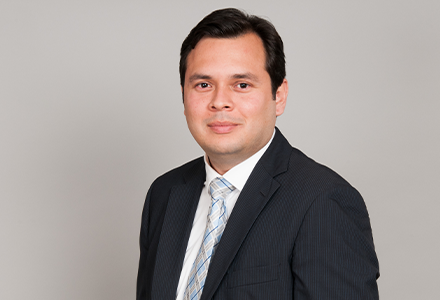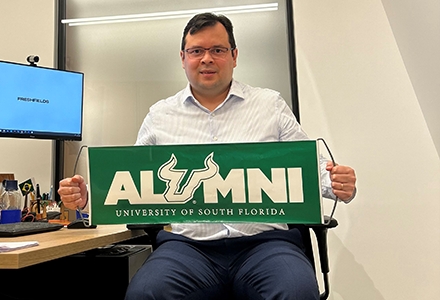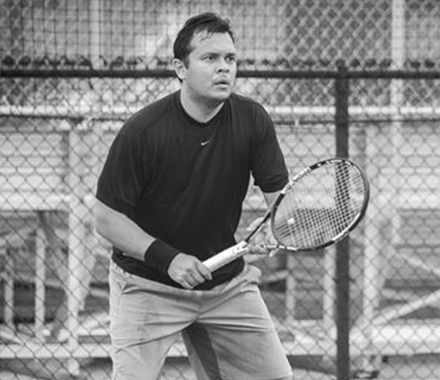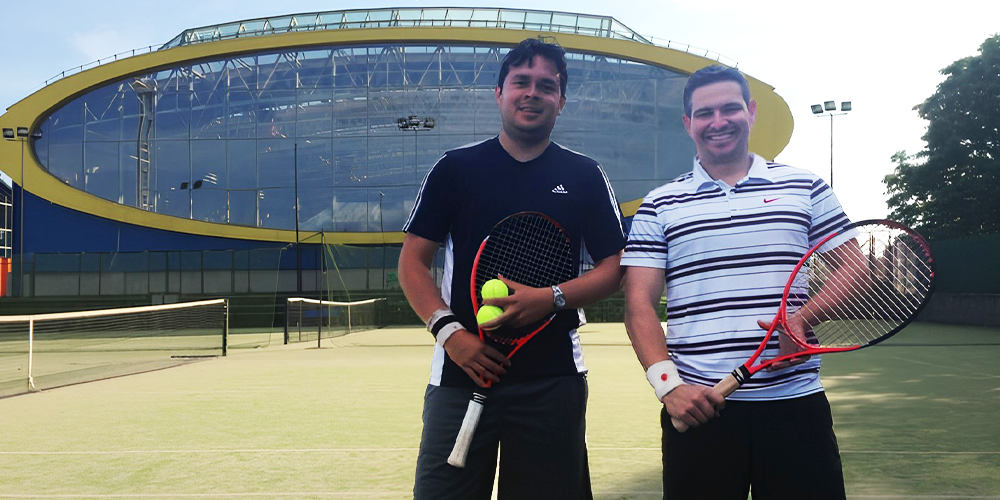
Behind Yuri Mantilla’s desk in Paris—where he works as a lawyer at Freshfields Bruckhaus Deringer in international law — is a sketch of a tennis court during the French Open. “Tennis is the backbone of everything I’ve achieved in one way or the other,” Mantilla says. “Tennis brought me to the U.S. and eventually to USF, which I’m very grateful before.” Before playing tennis internationally and being listed in the Lexology Index as a Global Elite Thought Leader for his accomplishments in the field, Mantilla was a student from Brazil coming to the U.S. to pursue his education. He speaks English, Portuguese, Spanish and French fluently.
“I wanted from the onset to go to law school that has roots back to home because my grandfather, who essentially raised me, was a lawyer and eventually a state judge,” Mantilla says. “I grew up being inspired by him and the profession. It was always my intention to eventually pursue a law degree, the only question was when.”
Knowing that he had to have an undergraduate degree before pursuing a degree in law, Mantilla was not in any rush. “I had a tennis scholarship,” Mantilla says. “And there was the finance degree that I really wanted to do.” Mantilla also realized that having a background in finance and an MBA could make him more competitive when applying to law school.
So, Mantilla started his education at Saint Leo University. “By being in that university, I came within the giant orbit of USF. It was a place that you look at and want to be a part of that community,” Manilla says. “It was just a matter of when and for what.”
He then transferred from St. Leo to Florida Gulf Coast University, which brought Manilla into the world of finance and started him on his journey to pursuing his MBA at USF. “It had the undergraduate in Finance that I really wanted,” Mantilla says. “It also brought me Division I Tennis, which I wanted to continue to play at a higher level.”

Deciding to stay within the orbit of Tampa Bay, Mantilla began working towards his MBA at USF. While at USF, there were two classes that Mantilla recalls being particularly impactful: one on financial statement analysis and a second on business applications. “My Financial Statement Analysis course was impactful because it was the class that I got the lowest grade in my MBA,” Mantilla says. “Being so challenging, it was the one I put the most effort in and I just felt quite interested to look at financial statements of companies.
“I can say this is extremely important because one of the things I do in most of my cases in the past 10 years is precisely on the quantification of damages of quite complex projects,” Mantilla notes. “Having had that MBA and this specific class helps me in my advocacy of digesting this information and try to explain to the tribunal in plain English.” The other class that Mantilla remembers as impactful was Integrated Business Applications I and II. “Essentially, it’s a year-long course where me and a group of students— our group was very international — were set to go in to a company near Tampa and learn about their business and put together a business plan,” Mantilla says. “It was extremely helpful to understand how to look at any business by putting together a plan and trying to understand the difficulties, the challenges and the opportunities.”
A global ambition
“I spoke three languages from the outset, so having an international background, I thought it’d be interesting to put the legal aspect within that context.”
After his MBA at USF, Mantilla pursued his degree in international law at Nova Southeastern University Shepard Broad School of Law receiving his law degree and a J.D. equivalent at Universitat de Barcelona. “Before going to the U.S. I lived in Spain for several years,” Mantilla says. “I spoke three languages from the outset, so having an international background, I thought it’d be interesting to put the legal aspect within that context.”
After law school, Mantilla’s goal was to be involved in international dispute settlements, which drew him to the World Trade Organization and the UN’s branch on trade and development, United Nations Conference on Trade and Development, which helps developing countries benefit from the global economy by using trade as a mode for sustainable development.
“Those entities were in Geneva, Switzerland. So, I wanted to get an internship in one of these entities,” Mantilla said. “I’m not the only one, as you can imagine. Those international organizations receive applications non-stop from all over the world.”
Mantilla recalled the day he received a call from UNCTAD to set up an interview for an internship. When he asked the caller what had sparked UNCTAD’s interest in him, the response was: “It was your MBA that set you apart.”
Mantilla completed an internship with the UNCTAD, and then subsequently went on to do an internship with the WTO in the Legal Affairs Division only a few years later.
Earning international recognition
Listed in Lexology Index: Arbitration (previously Who’s Who Legal) as a future leader for the past three years, this year Mantilla was included as a Global Elite Thought Leader, a designation reserved for attorneys who are “worthy of special mention owing not only to their vast expertise and experience advising on some of the world’s most significant and cutting-edge legal matters, but also their ability to innovate, inspire, and go above and beyond to deliver for their clients,” Lexology Index notes.
“To me, it’s just a very rewarding recognition of what I try to achieve daily in my profession,” Mantilla says.
“It’s a privilege to serve and represent clients in some of their most demanding cross-border disputes worldwide … seeing that being translated into recognition is rewarding. It’s in the daily work that you put in that counts.”
In the coming years, Mantilla plans to continue to learn and serve his clients. “It’s an ever-learning experience,” he adds. “For each case, there’s some sort of complexity that’s new and it’s very challenging … It’s my focus right now to be the most complete advocate and lawyer that I can.”
Advice for Students
Mantilla has two immediate answers when asked what he would advise current USF students: Take your courses and build a network.
Mantilla has two immediate answers when asked what he would advise current USF students: 1) Take your courses and 2) build a network. “Take the time to study, to read and to do as well as you can in each course,” he says. “Because once you go onto your professional career, there will be many topics that you will wish you had spent more time looking at and learning about.
“I may sound a bit dorky, but take that course that sounds interesting, read the books that the professors tell you to read fully,” Mantilla says. “And just think that if you don’t do it now, it’ll be very difficult to do later.”
It’s also vital to network early. “This is the moment for you to connect with people who could potentially be your client, your employer,” Mantilla says. “Take that time to establish great friendships and great connections.”
While at USF, Mantilla took his own philosophy to heart. “In my time, it was a melting pot of cultures all around the world, especially in the masters’ program,” Mantilla says. “So, there’s a connection that, if one day you want to go to India, you could contact a friend who could show you around.”
On and Off the Court

Before Tennis brought Mantilla to the U.S., he played tennis in Spain, traveling internationally for tournaments, which he said exposed him to different cultures that he still draws on professionally. Tennis continues to be a large part of Mantilla’s life. “Tennis is always there in almost every decision,” Mantilla says, sharing an example from his internship at UNCTAD in Geneva.
Mantilla was invited to play at a tennis club on the property of the U.S. mission to the United Nations and the World Trade Organization. “So, as you can imagine, a bunch of the people who would come and circulate there were precisely the diplomats or lawyers that were working in the fields that I wanted to eventually go into,” he says, “The people that I admired for their work and their positions in places that I wanted to be, admired me a bit for what I could do on the tennis court,” Mantilla says. “It’s brought me a lot of interesting connections that eventually became friends that opened doors for me.” Mantilla is still an active player on the court. “I’m playing for the Paris Bar now on a team that plays some international tournaments,” Mantilla says. “It’s good networking. It has opened doors and brought me to USF. I hope I can continue to play until I’m very old.”
